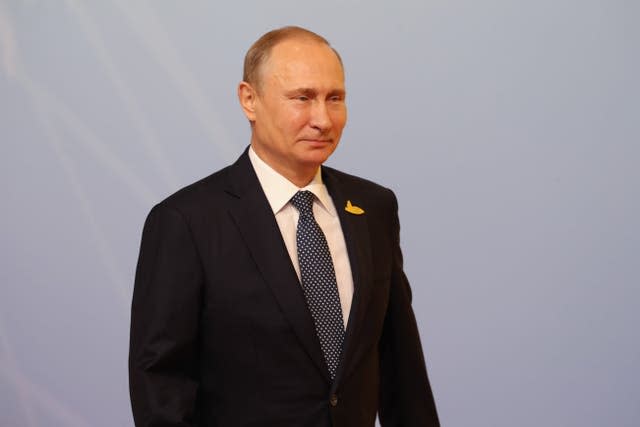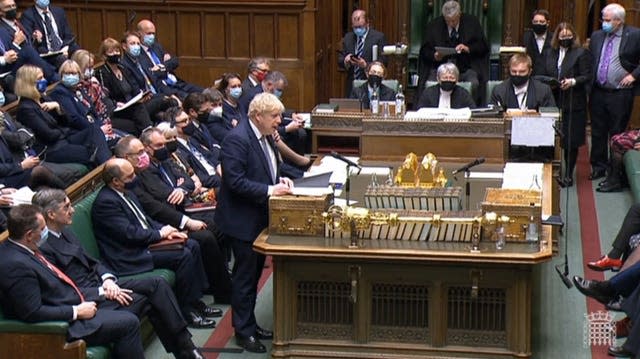UK not ruling out support for sanctioning Putin if Russia invades Ukraine
Foreign Secretary Liz Truss has said the UK is not ruling out support for personal sanctions against President Vladimir Putin in the event of a Russian incursion into Ukraine.
Ms Truss made the comments after US President Joe Biden suggested moving to penalise the Russian president could be an option in the case of an invasion.
When asked on Tuesday if he could see himself sanctioning President Vladimir Putin in those circumstances, Mr Biden told reporters: “Yes, I would see that.”
Asked if the UK would support personal sanctions against the Russian president, Ms Truss told BBC Radio 4’s Today programme on Wednesday that the Government had “ruled nothing out”.
“We have ruled nothing out in terms of sanctions, and in fact we’ll be legislating to toughen up our sanctions regime and make sure we are fully able to hit both individuals and companies, and banks, in Russia in the event of an incursion,” she said.
“What’s important is that all of our allies do the same, because it’s by collective action, by showing Vladimir Putin we’re united, that we will help deter a Russian incursion.”
She also called on the UK’s allies to “do more” to support Ukraine.
Asked if she was worried about united action, she said: “We would like to see our allies do more to help supply defensive support to Ukraine and also put those sanctions in place.
“We have made huge progress. I hosted the G7 in Liverpool in December and all of the G7 agreed that there would be severe economic costs if Vladimir Putin invades Ukraine.”
Ms Truss told Sky News that Russia would face “severe sanctions” in the event of an incursion into Ukraine.

“We are already supplying support to Ukraine. We’re supplying defensive weapons. We’re providing economic support,” she said.
“We are urging Russia to desist from an incursion and we’re making it very clear that if they were to do that there would be severe economic cost to Russia – severe sanctions.”
On what these sanctions could look like, she said: “They would target individuals, they would target financial institutions and they would be co-ordinated with all of our allies across Europe, the United States and others.”
Boris Johnson said on Tuesday that Britain was prepared to deploy troops to protect Nato allies in Europe should Russia invade Ukraine, as he warned Mr Putin faced “ferocious” Ukrainian resistance.
Asked about this on BBC Radio 4’s Today, Ms Truss said: “We already deploy troops in Estonia as part of our enhanced forward presence. We are looking at what more we can do. We’re working very closely with allies.
“I had a meeting with the Nato secretary general in Brussels earlier this week to discuss that, but the UK is already at the forefront of providing forces in Estonia and providing broader support across eastern Europe.
“But be in no doubt, Nato is determined to increase support on the eastern flank to support our Nato allies, who of course we have strong obligations to.”
The Prime Minister also said on Tuesday that the UK and its allies stood ready to impose “heavy economic sanctions” on Russia and voiced fears that any invasion would result in “bloodshed comparable to the first war in Chechnya or Bosnia”.
Mr Johnson told the House of Commons: “If Russia pursues this path, many Russian mothers’ sons will not be coming home.
“The response in the international community would be the same and the pain that would be inflicted on the Russian economy will be the same.”
Putin’s aggression threatens peace in Europe and runs counter to Labour’s core values of internationalism and the rule of law.
We must stand firm and united in our support for Ukraine. https://t.co/8WrRp73SnT
— David Lammy (@DavidLammy) January 25, 2022
He made an appeal for diplomacy to resolve the tensions and avoid a war that would “earn and would deserve the condemnation of history”.
Labour leader Sir Keir Starmer said on Tuesday that his party “stands resolute” in supporting Ukraine’s independence and sovereignty.
Mr Johnson, making a statement to the Commons, went on to say: “The British Army leads the Nato battle group in Estonia and if Russia invades Ukraine, we would look to contribute to any new Nato deployments to protect our allies in Europe.”
He also told MPs the UK could not “bargain away” the vision of a free Europe which emerged between 1989 and 1991, adding: “We will not reopen that divide by agreeing to overturn the European Security Order because Russia has placed a gun to Ukraine’s head, nor can we accept the doctrine implicit in Russian proposals that all states are sovereign, but some are more sovereign than others.
“The draft treaty published by Russia in December would divide our continent once again between free nations and countries whose foreign and defence policies are explicitly constrained by the Kremlin in ways that Russia would never accept for herself.”

He went on: “There is nothing new about large and powerful nations using the threat of brute force to terrify reasonable people into giving way to otherwise completely unacceptable demands.
“But if President Putin was to choose the path of bloodshed and destruction, he must realise that it’d be both tragic and futile, and nor should we allow him to believe that he could easily take some smaller portion of Ukraine – to salami-slice – because the resistance would be ferocious.”
Russian troops have massed at the border with Ukraine and intense diplomatic activity has failed to ease tensions.
Sir Keir said: “For too long the implicit message to Moscow has been that President Putin can do what he likes and the West will do little to respond.
“We must now change course and show Russia that any further aggression will result in severe real-world consequences.”


